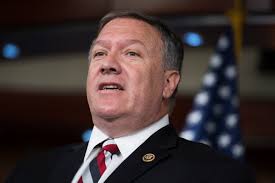Mike Pompeo’s nomination to be secretary of state cleared the Senate committee vote he needed by the narrowest of margins. It was a single vote.
Then the full U.S. Senate voted today to confirm him. The vote was 57-42; Republican John McCain was absent and unable to vote.
What does this mean for the new secretary? The way I see it, it means he has little bipartisan backing to tackle the difficult tasks of forging a foreign policy that commands the attention and respect of our nation’s allies and, yes, its foes.
Secretaries of state traditionally get huge margins. The only recent secretary of state to be confirmed by a margin comparable to the one that Pompeo earned was, interestingly, Donald J. Trump’s first secretary of state, Rex Tillerson.
The Associated Press reported that every secretary of state dating back to the Carter administration had received at least 85 Senate votes for confirmation.
Why is this important? Foreign policy shouldn’t fall along partisan lines. It shouldn’t reflect the deep divisions within our nation’s partisan political machinery. The United States should speak with a single voice when it deals with foreign policy. That’s long been a tradition. Sadly, that longstanding practice now appears to be buried under the deep and bitter partisan divisions.
It reflects the chasm that separates Republicans and Democrats. It is unhealthy in the extreme, particularly since Secretary Pompeo now must take the lead on preparation for the unprecedented summit between Donald Trump and Kim Jong Un, the mercurial leader of North Korea.
Pompeo and Kim already have met. No one has reported precisely how that first meeting — conducted under the cover of secrecy — produced, other than the president saying something about Pompeo and Kim getting “along well.”
The Senate vote will stand, though, as a message that the new secretary of state doesn’t have the bipartisan support he needs to move forward as the prime spokesman for our foreign policy apparatus.
My hope is that he earns it.
